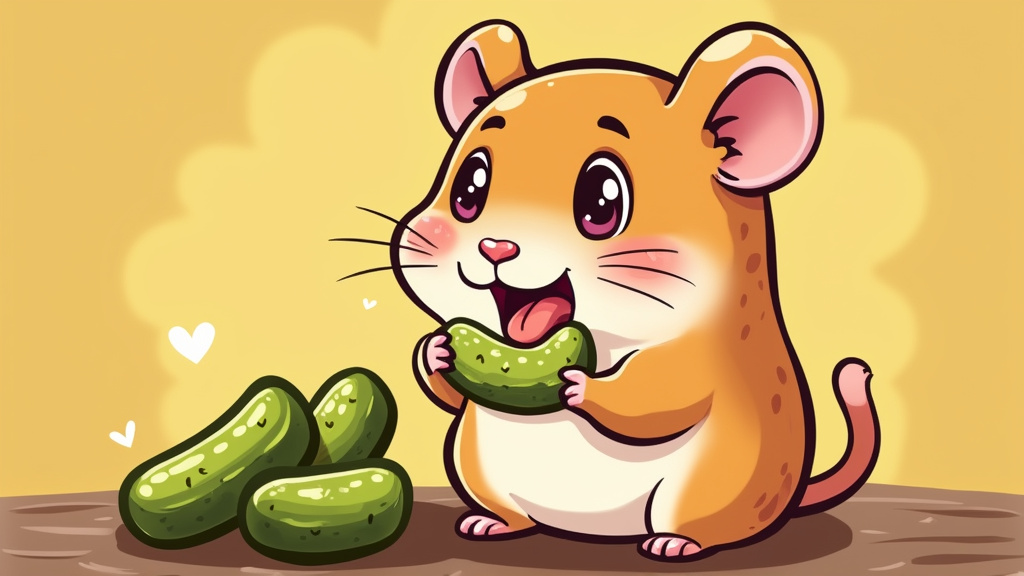Can hamsters eat pickles? It’s a question that might seem straightforward at first glance. After all, pickles are made from cucumbers, which are a safe and hydrating snack for hamsters. However, while cucumbers are fine, pickles are a different story. The process of pickling changes their composition, introducing ingredients that can be harmful to these small pets.
The misconception that pickles are safe for hamsters stems from the fact that they’re made from cucumbers. But the reality is that hamsters should not eat pickles. The high salt content, vinegar, acidity, and potential additives make pickles an unsafe and even dangerous choice for hamsters.
Why Pickles Are Harmful to Hamsters
High Salt Content
Pickles are typically soaked in brine, which contains a significant amount of salt. A small pickle spear can have around 283 mg of sodium, which is far too much for a tiny animal like a hamster to handle. This excessive salt can lead to dehydration in hamsters, which manifests in symptoms like lethargy, dull eyes, and darker-than-normal urine. Dehydration in hamsters is a serious condition that can escalate quickly, often requiring veterinary attention to prevent further complications.
Vinegar and Acidity
The vinegar used to preserve pickles is another harmful ingredient for hamsters. Vinegar is highly acidic and can upset a hamster’s delicate digestive system. This can result in stomach discomfort, leading to diarrhea. Diarrhea in hamsters can cause rapid dehydration, as their small bodies lose fluids and electrolytes faster than they can be replaced. This combination of acidity and dehydration makes pickles especially risky for hamsters.
Potential Additives
Many pickled products include additional seasonings or preservatives that can be toxic to hamsters. Ingredients like garlic or chili, commonly used in pickling recipes, are dangerous for hamsters. Garlic, for instance, can cause digestive problems, and in some cases, it can even be toxic to small animals. Additionally, many commercial pickles contain preservatives or other additives that may not be listed in detail on the packaging. These unknown ingredients further increase the risk of harm to your pet.
Safe Alternatives to Pickles
Plain Cucumbers
While pickles are a no-go, fresh cucumbers are a great, safe option for hamsters. Cucumbers are hydrating and low in calories, making them a healthy snack when offered in moderation. They provide water content that can help keep your hamster hydrated without any of the harmful additives found in pickles. Just be sure to wash the cucumber thoroughly and cut it into small, hamster-sized portions to avoid choking hazards.
Other Safe Vegetables
If you’re looking to vary your hamster’s diet, there are plenty of other vegetables that are both safe and nutritious. Some hamster-friendly vegetables include:
- Zucchini: Low in calories and high in water content, zucchini is a refreshing treat that can help keep your hamster hydrated.
- Broccoli: Packed with fiber and vitamins, broccoli provides essential nutrients, though it should be given in small amounts to avoid gas buildup.
- Carrots: Carrots are rich in beta-carotene and provide a satisfying crunch for your hamster, but they should be fed sparingly due to their natural sugar content.
- Spinach: Full of iron and vitamins, spinach can be a healthy addition to a hamster’s diet in moderation.
These vegetables offer hydration and essential nutrients without the risks associated with pickled foods, making them excellent choices for a balanced and safe diet.
Conclusion
In summary, hamsters should not eat pickles due to the high salt, vinegar, and potential additives that pose serious health risks, such as dehydration and digestive issues. Instead, stick to fresh, hamster-friendly vegetables like plain cucumbers, zucchini, broccoli, carrots, and spinach. By choosing safe and nutritious alternatives, you can ensure your hamster stays healthy and happy with a well-balanced diet tailored to their needs.

